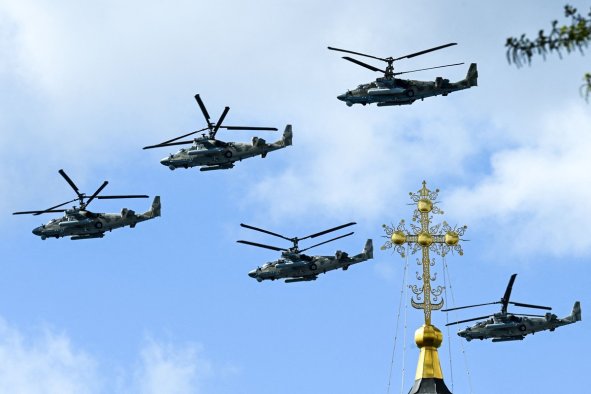The U.S. intelligence community believes America will have to contend with increasingly frequent "gray zone" attacks by its geopolitical rivals, who are willing to employ "diverse and damaging" means to undermine the country on the world stage.
A July 31 report, published by the Office of the Director of National Intelligence (ODNI), outlined the nature of the new threat facing the U.S., which it said "will create both concrete and intangible threats to the United States and its partners, U.S. commitments, and the international order."
"Through 2030, great power competition and international relations generally will increasingly feature an array of hostile 'gray zone' activities," the report read. "As China, Iran, North Korea, and Russia seek to challenge the United States and gain advantage over other countries through deliberate campaigns, while also trying to avoid direct war."
In the attached lexicon, the ODNI defined the "gray zone" as the realm of interstate competition which falls between peaceful interstate relations and armed conflict.
The activities which take place in this zone include, among others, cyber-attacks, acts of "economic coercion" and informational campaigns to "sow division, undermine democratic processes and institutions, or steer policy decisions in favor of the foreign actor's objectives."
Matthew Savill, the director of Military Sciences at the Royal United Services Institute and a former civil servant within the U.K. Ministry of Defense, spoke to Newsweek about the concept of a geopolitical "gray zone," and the activities which fall under this umbrella.
While Savill said that many of these activities were arguably as much a feature of the Cold War as 21st Century statecraft, he acknowledged that recent developments have made them a larger concern for states.
"Developments in cyber capabilities and globalization have provided more points of vulnerability and therefore opportunities for such acts," Savill said, before adding that "examples abound" of recent gray zone activities by the four states the ODNI identified.
"Russian attempts—via covert means or proxies like the Internet Research Agency—to amplify existing political division in the West fit the bill because of their subversive intent," Savill said.
The Internet Research Agency was a Russian organization engaged in covert, online influence operations, which former Facebook Chief Security Officer Alex Stamos accused of using "complex networks of inauthentic accounts to deceive and manipulate people who use Facebook, including before, during and after the 2016 U.S. presidential elections."
Savill also listed "notionally non-military" activities by China in the Indo Pacific as examples of gray zone actions, such as using its coastguard to threaten and pressure countries such as the Philippines into accepting its maritime claims in the South China Sea.
North Korea, meanwhile, has made notable use of cybercrime in recent years, both to prop up its own economy and as an offensive tool against foreign states and individuals.
Savill referred to a May report by United Nations Security Council sanctions monitors, which revealed that Pyongyang had engaged in 97 cyberattacks between 2017 and 2024, the total damage of which was valued at around $3.6 billion.
This included an attack in which $147.5 million was stolen from the HTX cryptocurrency exchange before being laundered in March.
The ODNI said that these sorts of campaigns "are likely to increase and diversify because of more enabling technologies, the erosion or absence of accompanying norms, challenges with attribution, and perceptions of their advantages."
However, it also warned that they will also become a more multilateral phenomenon, as "a convergence of worldviews and deepening ties among US geopolitical opponents are creating a foundation for more direct collaboration."
Do you have a story we should be covering? Do you have any questions about this article? Contact LiveNews@newsweek.com.
Disclaimer: The copyright of this article belongs to the original author. Reposting this article is solely for the purpose of information dissemination and does not constitute any investment advice. If there is any infringement, please contact us immediately. We will make corrections or deletions as necessary. Thank you.



